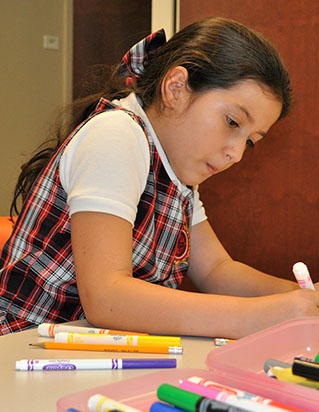Fast Start Academy
 The summer of 2016 saw the implementation of Fast Start Academy 2.0. The Fast Start
Academy began in 2001 as a community engagement project through Volunteer Kennesaw,
but when a re-organization in VKSU threatened to shutter its doors, the Bagwell College
of Education stepped up to save it.
The summer of 2016 saw the implementation of Fast Start Academy 2.0. The Fast Start
Academy began in 2001 as a community engagement project through Volunteer Kennesaw,
but when a re-organization in VKSU threatened to shutter its doors, the Bagwell College
of Education stepped up to save it.
Focused on reading and literacy, the program is now housed in the Center for Literacy and Learning in the BCOE.
“Summer 2016 was the first version of the program that was managed by the BCOE,” said Center for Literacy and Learning Co-Director Megan Adams. “The two lead teachers in the Fast Start classroom were teacher candidates and each was recommended by at least two professors in the department of Elementary and Early Childhood Education. They were two of the top students in their programs.”
In addition to the lead teachers, students had the benefit of six America Reads tutors, referred to as assistant lead teachers.
“What was really amazing was the ownership the lead teachers accepted for the project, designing the curriculum, training other tutors, organizing the times that reading tutors came in and how that would work,” Adams said. “Originally, the program was meant to help students at least two grade levels behind in reading, but once we completed the literacy assessments, we found some of the students were reading at a middle or high school level. In future summers the program will only be for rising third and fourth graders performing below grade level.”
The program is also aimed at students from low socioeconomic backgrounds.
“It certainly is a program that is reaching students from low socioeconomic backgrounds, and at the same time, it’s giving our preservice teachers experience working exclusively with -students from low socioeconomic backgrounds,” Adams said. “Because of where we’re located a large percentage of our preservice teachers do their field experiences in Cobb and Cherokee counties and often in schools that are non-Title 1 schools. The projection for the next 10 years, however, is they are going to be working with students from low socioeconomic backgrounds and there are different teaching theories to help our teachers perform better with marginalized students. We want to make sure they are getting those experiences.”
Previously, between 25 and 30 students participated in the academy, but Adams said she and co-director Sanjuana Rodriguez hope to grow the program to more than 50 students each summer attending class for three to four weeks.
“Previously, students found out about the program through word of mouth and teacher recommendations, but we hope to shift to a data-driven program that identifies the kids that really need the most intensive summer help,” Adams said.
The program has also provided research opportunities for BCOE faculty. “It’s this rich resource for folks who are interested in how our field experiences impact our candidates,” she said.
Researchers have already published two chapters and are working on an article for publication about the change in preservice teachers’ sense of efficacy in working with this student population.











